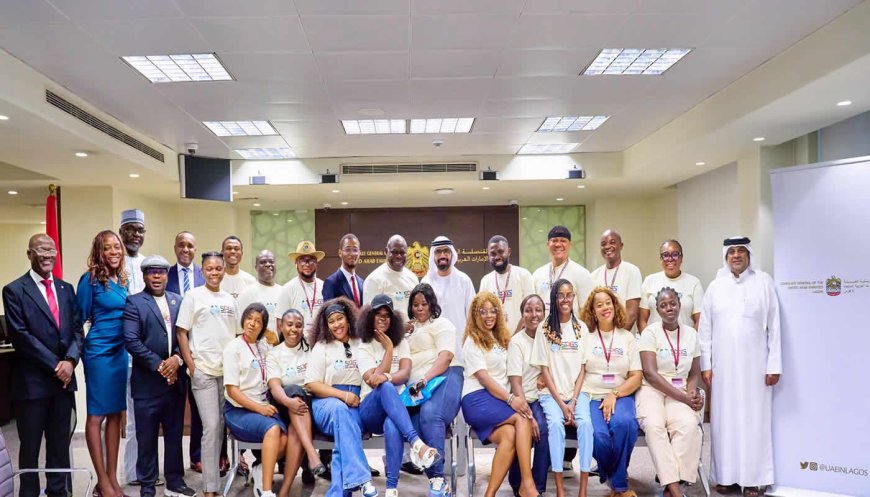Nigeria-UAE non-oil trade hits record $4.3bn

Trade relations between Nigeria and the United Arab Emirates rose to a record $4.3bn for non-oil commodities in 2024, The PUNCH reports.
In a statement on Monday, the UAE Consul-General in Lagos, Salem Al Jaberi, stated this during a visit by Master’s degree students from the Department of Diplomacy and Strategic Studies at the University of Lagos, who were on a visit as part of their practical exposure in learning.
Speaking during the visit, Al Jaberi described Africa as a unique hub for business investments, stressing that the UAE in 2024 had the second-highest foreign direct investment ratings on the continent of Africa.
He noted that the Consulate General of the UAE in Lagos was the first in Africa, stressing that Nigeria is one of the Emirates’ most strategic partners in the region, “even as Lagos serves as the economic capital.”
“The trade relations between the UAE and Nigeria reached $4.3bn for non-oil commodities in 2024.
However, the numbers could be much higher with better partnerships across the board,” the Consul General said.
Al Jaberi maintained that the numbers could be much higher, adding that there is a need for more partnerships. “You would observe that the UAE was among the top 5 trading partners in Nigeria in the second quarter of 2025. What we do majorly is to facilitate market access for UAE investments in Nigeria via business-to-business, business-to-government, government-to-government, among others,” Al Jaberi posited.
According to him, the UAE has signed a Comprehensive Economic Partnership Agreement with 11 countries, including Kenya and India, even as he expressed optimism that a similar treaty would be reached with Nigeria to further simplify trade across frontiers.
Earlier, an Associate Professor of Diplomacy and Strategic Studies, UNILAG, Henry Ogunjewo, stated that the visit provided a rare opportunity to acquaint students with the realities and activities involving bilateral relations, theories, and principles learnt in the classroom.
“We teach about economic relations and diverse kinds of relations at the Department of Diplomacy and Strategic Studies at UNILAG. However, this has been a beautiful outing and these Master’s Degree students are ready to explore partnerships with the UAE as they bid to become first-class diplomats,” Ogunjewo said.
He emphasised that the UAE has been too conservative on the laudable work that it is doing in Africa, and in Nigeria, underscoring the need for the public to know about the level of economic opportunities as well as the cultural and humanitarian aid.
“I believe that a stronger relationship between the Consulate and our students could provide a platform to better understand the UAE’s consulate activities in a symbiotic relationship,” he noted.
Speaking on behalf of the students, Chizoba Benson, thanked the UAE Consulate for the opportunity to engage and expressed optimism that more privileges will be extended to partners via research and other diplomatic relations.
In 2023, the trade relationship between Nigeria and the United Arab Emirates was characterised by substantial flows in both directions, with the UAE exporting more to Nigeria than Nigeria exported to the UAE.
According to COMTRADE data, the United Nations database that aggregates detailed global annual and monthly trade statistics by product and trading partner for use by governments, the UAE’s exports to Nigeria were about $1.42bn, consisting mainly of vehicles, electrical/electronic equipment, and machinery/boilers, among other manufactured items.
Meanwhile, Nigeria’s exports to the UAE were smaller, about $1.32bn, with the largest share being pearls, precious stones, metals, and coins, followed by mineral fuels and oils.
The balance of trade in 2023 between the two countries favoured the UAE, with Nigeria importing more from the UAE than it exported. While the gap is not extremely large in absolute dollars, the trade imbalance reflects structural features in both economies: Nigeria’s stronger endowment (and export) in raw and precious commodities, and the UAE’s comparative advantage in manufactured goods, logistics, and processing.
The tilt also suggests areas for possible policy or commercial interventions, such as value addition in Nigeria, diversifying its range of exports, or negotiating terms that could enhance trade in value added goods.









